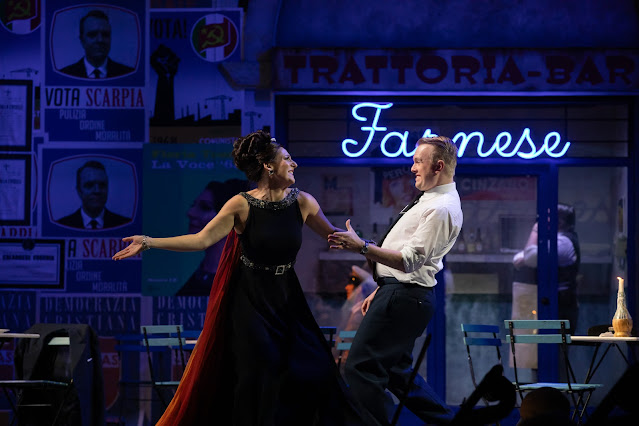 |
| Puccini: Tosca – Amanda Echalaz & Morgan Pearse – Opera Holland Park, 2024 (Photo: Ali Wright) |
Puccini: Tosca; Amanda Echalaz, José de Eça, Morgan Pearse, director: Stephen Barlow, conductor: Matthew Kofi Waldren, City of London Sinfonia; Opera Holland Park
Reviewed 30 May 2023
Transposed to the student ferment of Rome in 1968, this revival breathed remarkable life into the concept and showcased a trio of strong performances for a satisfying evening in the theatre
With this year’s centenary of Puccini’s death, Opera Holland Park (OHP) is celebrating a composer whose works play an important part in the company’s output, both the popular ones and the lesser known. In February the company performed the Messa di Gloria in concert and in July they will revive his early rarity Edgar, however the season opened with Tosca, not in a new production but in a revival of Stephen Barlow’s 2008 production which transposes the setting to Rome in 1968, with the original Tosca, Amanda Echalaz, returning to the role.
We caught the second performance of Puccini’s Tosca at Opera Holland Park on Thursday 30 May 2024. The production was directed by Stephen Barlow and designed by Yannis Thavoris with lighting by Tim van ‘t Hof, Matthew Kofi Waldren conducted the City of London Sinfonia (celebrating 20 years as OHP’s house band), with Amanda Echalaz as Tosca, José de Eça as Cavaradossi, Morgan Pearse as Scarpia, Edwin Kaye as Angelotti, Ross Ramgobin as the Sacristan, Phillip Costovski as Spoleta and Alex Jones as Sciarrone. The Opera Holland Park chorus was joined by children from the Cardinal Vaughan Memorial School and the Grey Coat Hospital School.
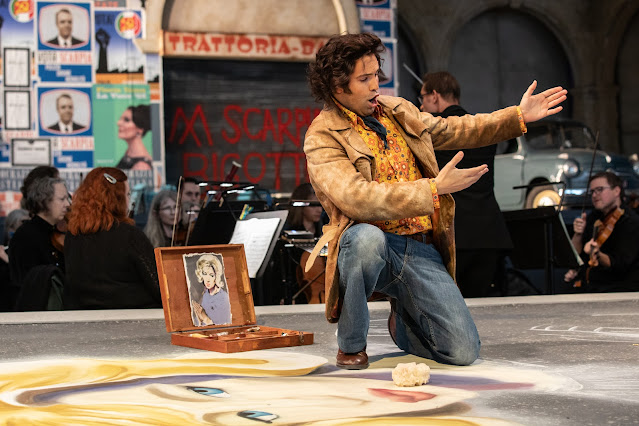 |
| Puccini: Tosca – José de Eça – Opera Holland Park, 2024 (Photo: Ali Wright) |
The veristic detail of Puccini’s opera presents a challenge to directors, particular towards the end of Act One. The music and the libretto seem to urge naturalism and realistic detail, yet getting the religious ceremonial both liturgically correct and dramatically coherent is a conundrum that few productions seriously solve. For me, the most satisfying, realistic Tosca production remains Anthony Besch’s 1980 one for Scottish Opera, that remained in the company’s repertoire for 30 years [details on the Opera Scotland website]. Not so much for the 1943 setting (brilliant though that was), but for the way Besch solved the Act One challenge. The alternative, of course, is to abandon realism and that is what made Edward Dick’s recent production at Opera North so satisfying [see my review].
The brilliance of Barlow’s production is that in solving the challenge of staging Tosca on OHP’s stage, with a single set, he sidestepped many of the issues.
Yannis Thavoris provided a single set which combined the façade of the church with a bar, called the Farnese (!) which is Scarpia’s hang-out. Everything takes place in and around the square, so that the end of Act One becomes a sort of church parade cum rally for Scarpia. There are fudges, of course, but nothing major. Cavaradossi is doing a piece of street art in chalks on the forestage, whilst a lone Fiat car does multiple duties from a hiding place for Angelotti to the scene of Tosca’s suicide.
If you are going to transpose the setting of an opera, then the new milieu should shed light on the work. Here, using the student ferment of 1968 allied to the corruption in politics meant that the audience has the right signals for the plot and does not need to read up to work out who the hell is whom and what do they support. For Tosca to work fully, audiences need to understand something of the back story and here we had it laid out for us.
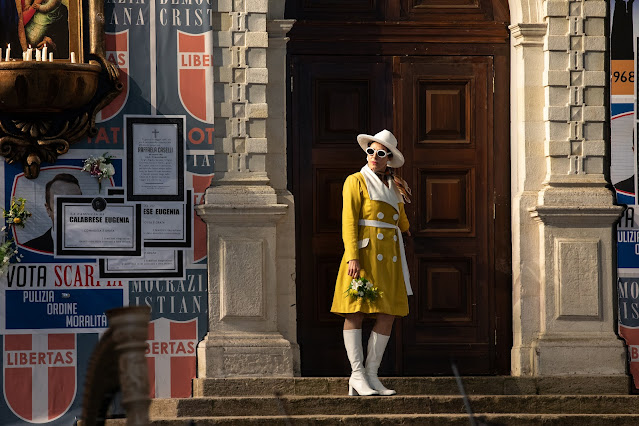 |
| Puccini: Tosca – Amanda Echalaz – Opera Holland Park, 2024 (Photo: Ali Wright) |
Looking for all the world like Monica Vitti, Amanda Echalaz made a poised and self-possessed Tosca. 16 years after first singing the role for OHP, Echalaz wisely did not try to bring off a girlish, youthful Tosca, here she was mature, challenging and highly conscious both of her image and her attractions. There was a slightly manipulating element to her behaviour in Act One, managing the rather unpredictable Cavaradossi of José de Eça.
When we saw Echalaz in the title role of Ponchielli’s La Gioconda at Grange Park Opera in 2022 [see my review], the more lyrical elements of the role were worryingly less satisfying, but here Echalaz encompassed both, successfully fining her voice down for ‘Vissi d’arte’ in Act Two, and producing a thrilling yet satisfying line in her duet with de Eça in Act One. One final element of credit, to designer Thavoris and the wardrobe department for Tosca’s stunning gown in Acts Two and Three.
Portuguese tenor José de Eça is an admirable find, making a slow-burn Cavaradossi with an element of seriousness to the character rather than the usual hothead, and looking remarkably different without beard and with a full wig. There was perhaps a lack of tonal range in de Eça’s acting, but this simply made his Cavaradossi seem rather more thoughtful than usual. A former baritone, de Eça has a firm, dark voice that becomes critical as it rises, giving his upper range a strength and excitement. The drawback seemed to be that in full voice, he offered us little light and shade, and it was in the more intimate moments that he developed a greater tonal palate.
But this was a singer who successfully gave us all the thrilling moments, in just the right way, and managed to join them all up into a coherent dramatic performance, rather than a sequence of juicy plums. There was one detail in Act Two that I rather liked. After Cavaradossi has been tortured (in the back of the bar!) when he returned, de Eça was not too ridiculously bloody and his attempt to stand for his shout of ‘Vittoria’ completely failed and de Eça delivered most of the aria prone. A nice example of realism triumphing over operatic desire to stand and deliver.
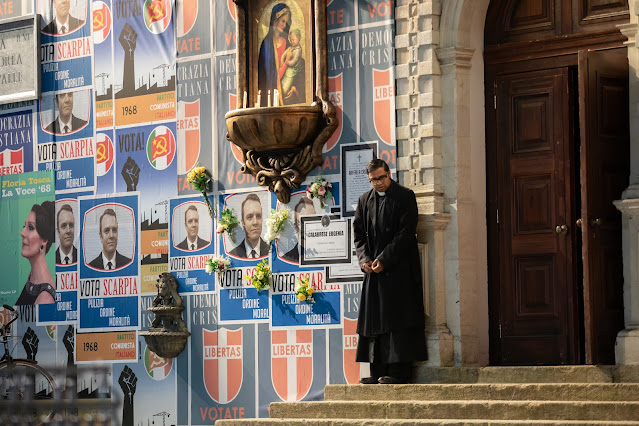 |
| Puccini: Tosca – Ross Ramgobin – Opera Holland Park, 2024 (Photo: Ali Wright) |
My previous experience of Morgan Pearse has been mainly in Handel [including the Brockes Passion with the Academy of Ancient Music in 2019, see my review], and more recently he was on Resonus Classics’ 2023 premiere recording of Ethel Smyth’s Der Wald [see my review]. Clearly, with this Scarpia, he is moving into larger, more dramatic territory, but doing so in an admirably focused way. There was something wonderfully controlled and firm about his voice, even in the biggest moments. He never tried to beat the orchestra, yet remained fierce and intense.
This Scarpia was a nasty piece of work, but there was an element of fatal attraction too, his contained power was seductive. Pearse brought out the element of manipulation and obsession in Act One, the final scene was certainly not just about the thrill of the voice, though there was that too, whilst in Act Two both he and Echalaz played a fine game of cat and mouse.
Ross Ramgobin was a characterful Sacristan in that he used character to comic effect rather than aiming for pure comedy. This was very much an ensemble performance, part of the whole rather than a cameo solo spot. Ramgobin suffered, to a certain extent, from the disposition of voices in the space. With José de Eça’s Cavaradossi on the fore-stage and Ramgobin’s Sacristan on the steps up to Holland Park House at the rear of the main stage, the Sacristan’s commentary on Cavaradossi’s soliloquy.
Phillip Costovski was a highly effective Spoletta, giving character to his narrations to Pearse’s Scarpia, whilst Alex Jones’ was wonderfully seedy as the bar-owner/thug Sciarrone. This Sciarrone had a boy helping him in the bar and it was this character who sang the solo in Act Three, finely done here by Angelo Aninag. Edwin Kaye was a suitably intense Angelotti, rather less hag-ridden than is usual, but no less impressive. Jack Holton made a suitably severe captor in Act Three.
The chorus was on fine form, vocally and physically, making a great noise at the end of Act One and clearly enjoying turning the rally/religious parade into a riot. And great fun had been had too with the 1960s dressing up box. The children were part of the ensemble, making a similarly fine showing.
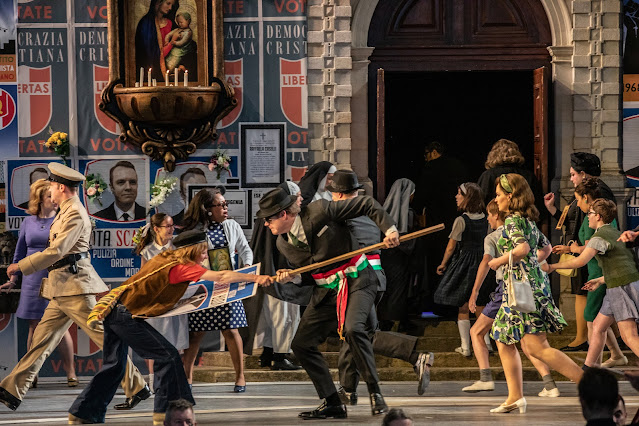 |
| Puccini: Tosca – Opera Holland Park, 2024 (Photo: Ali Wright) |
The performance used a reduced orchestration (by Tony Burke at Pocket Publications), but this was still a substantial orchestra (double woodwind and horns, trumpets, bass trombones, timpani, harp and three percussion) and you never felt short changed. Conductor Matthew Kofi Waldren drew a strong performance from the orchestra, supporting and complementing the singers. Waldren allowed the music to flow with the vocal line, care was taken over shaping and extending phrases, but this was never a performance which veered into stasis and you always sensed Waldren’s grip on the larger dramatic point; big moments were thrilling, and small ones were intense.
In an interview in the programme book, director Stephen Barlow commented about reviving the 16-year-old production that this was revisiting the old production rather than pure revival, but there was a strong element of ‘if it ain’t broke, don’t fix it’. The results were admirable, creating a satisfying evening in the theatre and a thoughtful take on Tosca whilst never feeling like a museum piece.
Never miss out on future posts by following us
The blog is free, but I’d be delighted if you were to show your appreciation by buying me a coffee.
Elsewhere on this blog
- Telling a story: Solomon’s Knot in stylishly vivid form for the Canon’s version of Handel’s Esther – concert review
- Doing Vivaldi proud: his Olympic opera performed with verve & imagination by Irish National Opera – opera review
- Creating something remarkable: Fatma Said & Joseph Middleton in Mozart, Schubert, Schumann, de Falla, Obradors & Hankash – concert review
- Thomas Roseingrave: Eight Harpsichord Suites and other keyboard works – record review
- International Handel Festival, Göttingen
- Combining disparate sounds with a bit of magic: Michel Godard and serpent in Göttingen – concert review
- Göttingen 1853: Johannes Brahms & Joseph Joachim, a meeting of musical minds evoked – concert review
- Quite a Summer: Tom Fetherstonhaugh and Fantasia Orchestra have three festival debuts including the BBC Proms – interview
- Dresden Music Festival
- The results were indeed glorious: Klaus Mäkelä and the Royal Concertgebouw Orchestra in Bruckner – concert review
- The journey continues: Dresden’s historically informed Ring returns with a revelatory Die Walküre – opera review
- Mozart in 1774: Samantha Clarke, Jane Gower, The Mozartists, and Ian Page on stylish form at Wigmore Hall – interview
- Vigour, energy & joy: A Choral Celebration of Queen Mary II from choirs of Royal Hospital Chelsea & Old Royal Naval College – concert review
- A neglected gem revived: New Sussex Opera in Lampe’s The Dragon of Wantley combining historic style and 1980s politics – opera review
- Home








